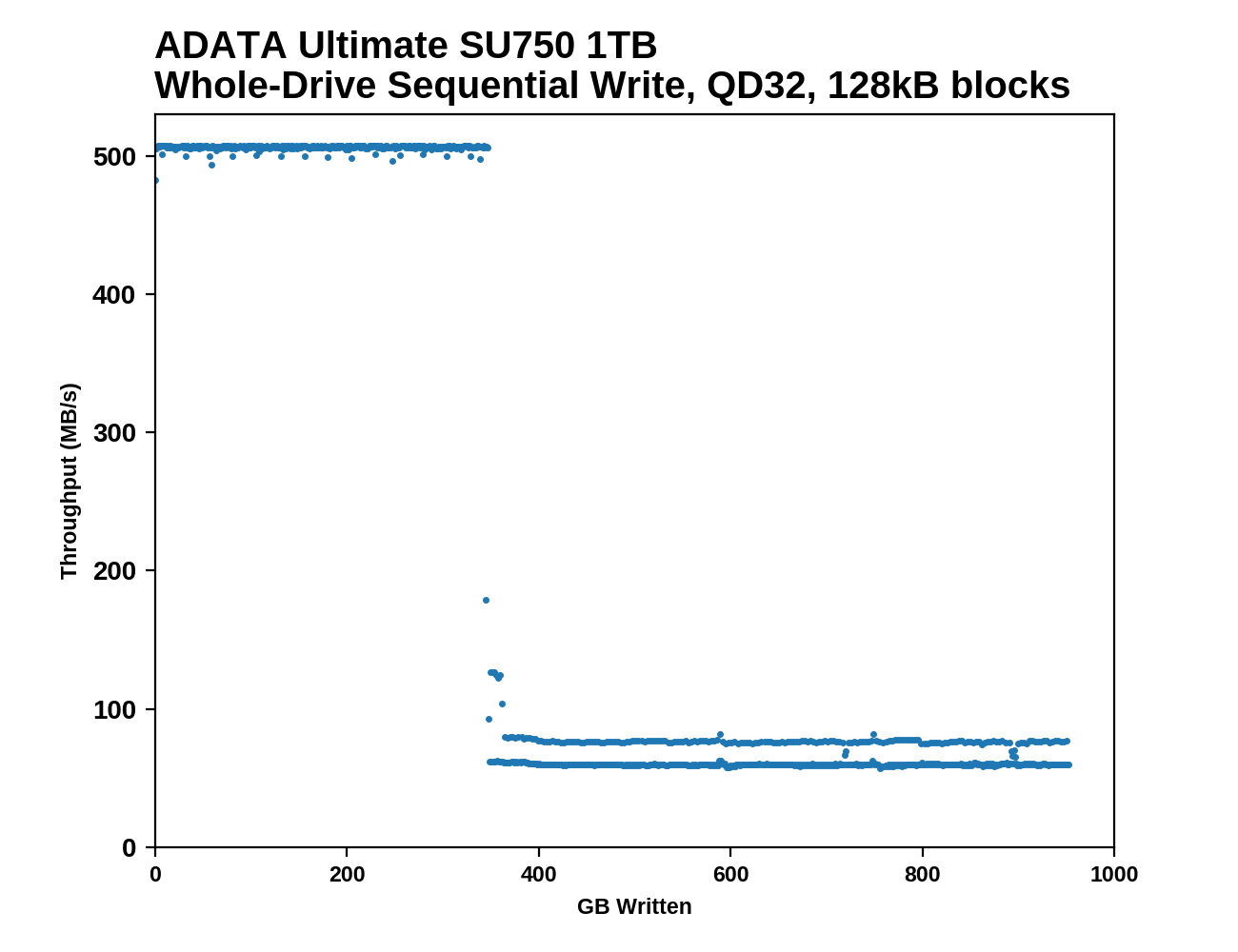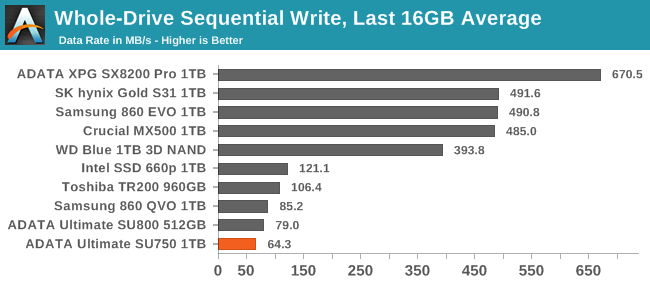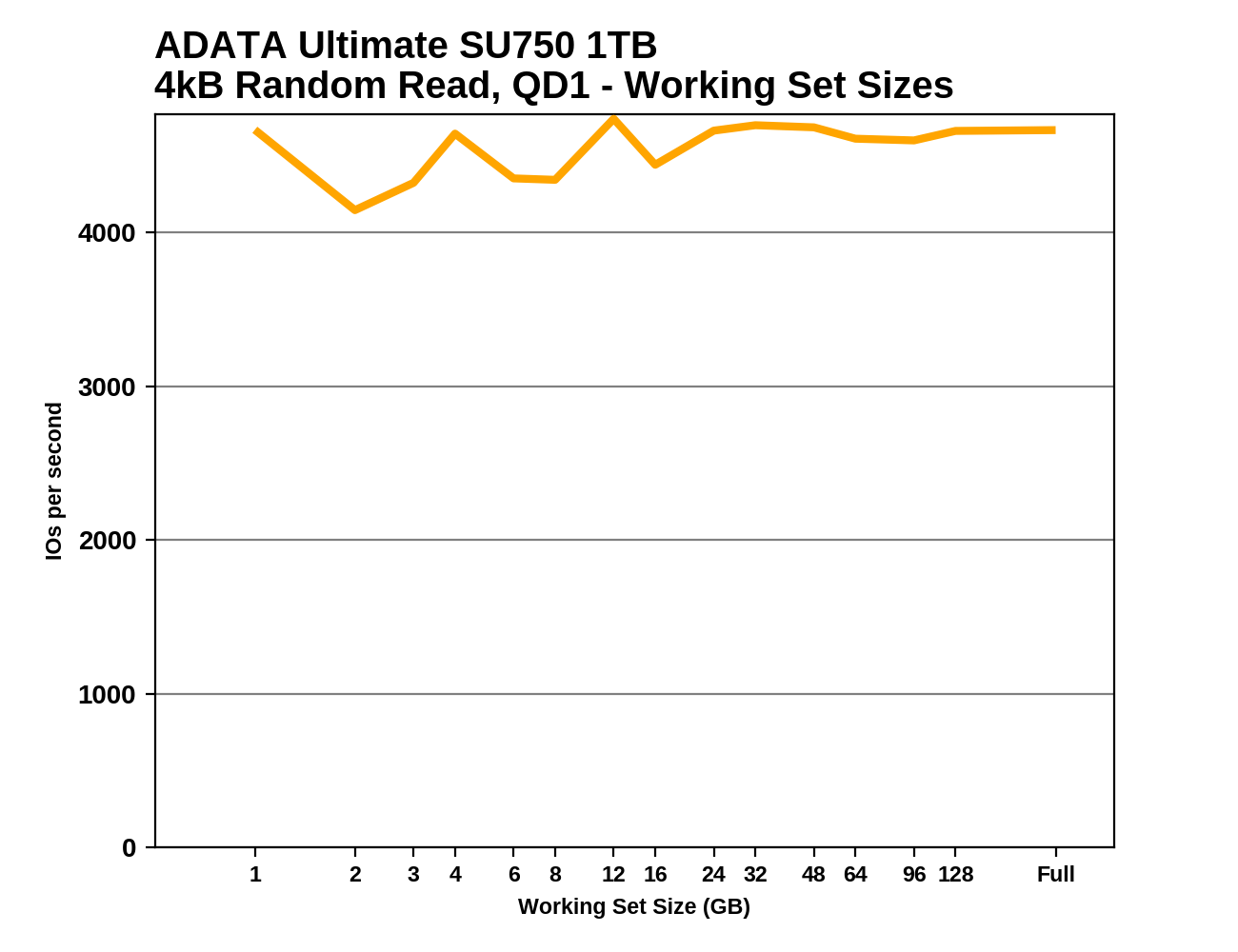The ADATA Ultimate SU750 1TB SSD Review: Realtek Does Storage, Part 1
by Billy Tallis on December 6, 2019 8:00 AM ESTWhole-Drive Fill
This test starts with a freshly-erased drive and fills it with 128kB sequential writes at queue depth 32, recording the write speed for each 1GB segment. This test is not representative of any ordinary client/consumer usage pattern, but it does allow us to observe transitions in the drive's behavior as it fills up. This can allow us to estimate the size of any SLC write cache, and get a sense for how much performance remains on the rare occasions where real-world usage keeps writing data after filling the cache.
 |
|||||||||
The SLC write cache on the 1TB ADATA SU750 is quite large, lasting for about 345GB of sequential writes before performance drops down to QLC-like speeds. In both phases, the performance is very consistent, and the transition when the SLC cache fills up is abrupt.
 |
|||||||||
| Average Throughput for last 16 GB | Overall Average Throughput | ||||||||
The post-cache write speed of the SU750 is actually even slower than the QLC-based Samsung 860 QVO, but the much larger cache on the SU750 means its overall average write speed across the entire drive filling process is slightly faster.
Working Set Size
When DRAMless SSDs are under consideration, it can be instructive to look at how performance is affected by working set size: how large a portion of the drive is being touched by the test. Drives with full-sized DRAM caches are typically able to maintain about the same random read performance whether reading from a narrow slice of the drive or reading from the whole thing. DRAMless SSDs often show a clear dropoff when the working set size grows too large for the mapping information to be kept in the controller's small on-chip buffers.
 |
|||||||||
The QD1 random read performance of the SU750 is fairly low regardless of the working set size. There's no clear indication of performance being affected by the size of the controller's caches for mapping information. Even when the random reads are confined to a mere 1GB slice of the drive, performance is no better than when reading from the entire drive. The Intel 660p is the only drive in this bunch that does show a clear performance drop, caused by it having a 256MB DRAM cache instead of the more typical 1GB for a 1TB drive.










54 Comments
View All Comments
Samus - Sunday, December 8, 2019 - link
I didn't even want to bring up Killer XDdeil - Monday, December 9, 2019 - link
Well ONLY cards where I lost sound due to broken drivers is realteck. AND coincidentally ONLY network adapter that was supposed to do full gigabit, and stopped negotiation at 10 mbps was also realteck.they can do decent hardware, but soft from them is crappiest as possible.
HollyDOL - Saturday, December 7, 2019 - link
My 1st hand experience with Realtek dates back to Pentium 4 era. And it was so bad then I am still avoiding anything done by them in almost panic mode. Maybe they improved since then, but I am still not in state of mind to spend few $ to try.Gigaplex - Saturday, December 7, 2019 - link
Intel was terrible in the Pentium 4 era. Do you also avoid Intel in the same way?HollyDOL - Saturday, December 7, 2019 - link
Intel never had problems with functionality or output quality. For many scenarios you had better perf/$ on Athlons, but you didn't have problems having multiple computers on same network with Intel NIC having same MAC, lousy sound quality infested with noise or very low NIC performance.So no, I am not avoiding Intel same way since I never had remotely similar problems with them.
close - Saturday, December 7, 2019 - link
They weren't that bad. After building a neighborhood network (100Mbps and constantly saturated with Direct Connect P2P transfers) with thousands of clients (perhaps in the 5 figures or close to), 99.9% being Realtek network chipsets I'd say many of the issues are a bit overstated. Sure Intel was (is?) better but other than crappy support in Linux at that time, there was nothing out of the ordinary bad with Realtek. Not one MAC issue, not very low performance.I'm sure those thousands are not representative of all Realtek sales but I think there must also be some bias in there where the multitude of reports on forums makes you think it's an absolute rule that they were crap. Sound cards... dunno, had them on many PCs but rarely cared about the sound back in the day.
Samus - Sunday, December 8, 2019 - link
Terrible performance maybe. But Intel has always been fairly reliable. They've had a few minor chipset recalls, and the embarrassing, but very limited Pentium III recall, but on the whole they have traditionally had less errata than AMD and quite frankly their chipsets were always the gold-standard of PC's. Their network controllers are among the best in the world.PeachNCream - Friday, December 6, 2019 - link
ADATA has gotta get out of this town, out of this town and out of L.A. - with those prices. TRIM them to around $80 for 1TB and they will have a Solid pricing State to Drive sustained sales.bananaforscale - Friday, December 6, 2019 - link
Realtek does Dallas Semi?Lord of the Bored - Friday, December 6, 2019 - link
No, Maxim did Dallas Semiconduotor.